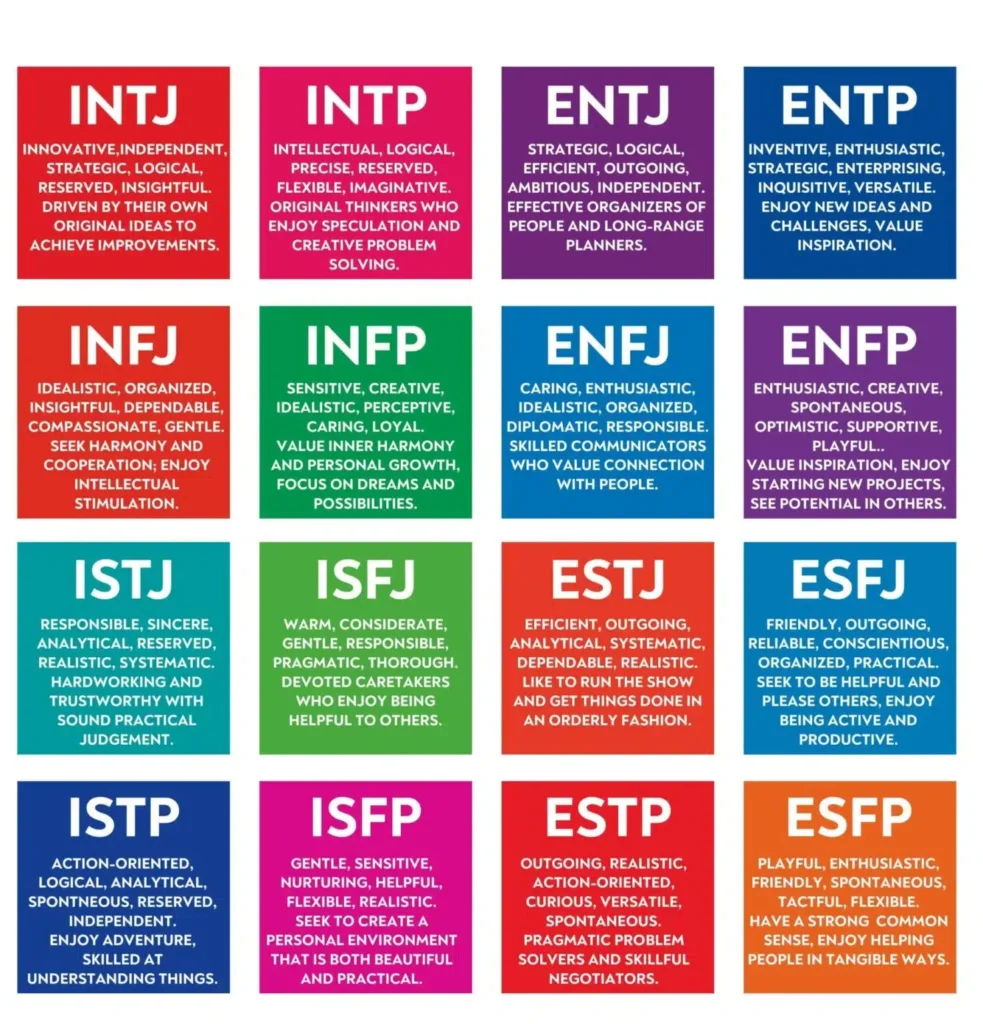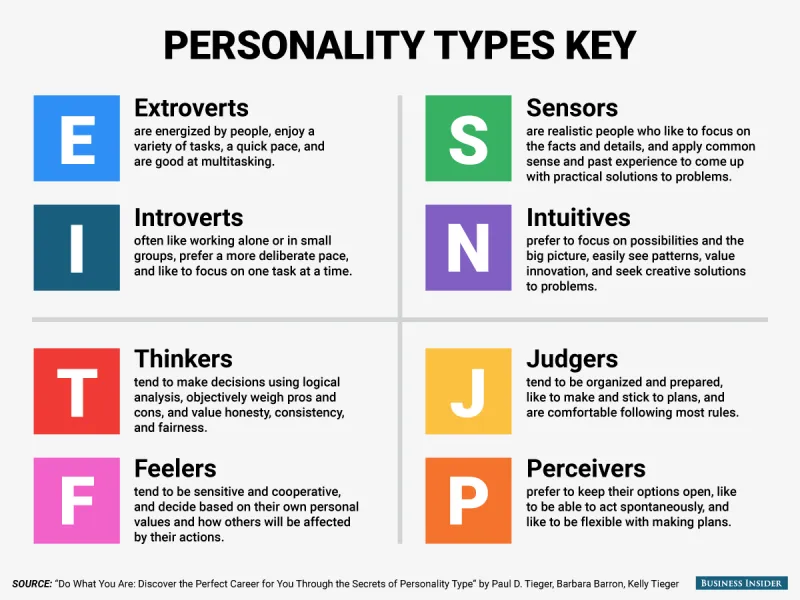|
Getting your Trinity Audio player ready...
|
Navigating relationships can feel like walking through a maze—rewarding, but sometimes confusing. That’s where the Myers-Briggs Type Indicator (MBTI) can offer gentle guidance.
Among the 16 personality types, there are 3 that often stand out for having especially successful relationships. These types tend to bring natural empathy, emotional intelligence, and thoughtful communication to their connections.
It’s not that other types can’t build strong relationships, but these three seem especially attuned to the deeper dynamics of love and connection. Understanding what makes them thrive can help us all cultivate more meaningful bonds. Let’s explore the qualities that set these personality types apart.
Read: 4 DISC Personality Types
Who is Myers Briggs?
Myers and Briggs are the last names of a mother-daughter team, Katharine Cook Briggs and Isabel Briggs Myers, who created the Myers-Briggs Type Indicator (MBTI).
They were inspired by Carl Jung’s ideas on personality types. Katharine started researching personality in the early 1900s to help people understand and appreciate their differences.
When Isabel joined her mom’s work, they aimed to apply Jung’s theories practically, especially to help people find jobs that fit their personalities during World War II.
Their collaboration resulted in the MBTI, a questionnaire that sorts people into 16 personality types based on preferences in four areas: where they focus their attention (Extraversion or Introversion), how they take in information (Sensing or Intuition), how they make decisions (Thinking or Feeling), and how they approach the outside world (Judging or Perceiving).
Even without formal psychology training, Briggs and Myers dedicated their lives to developing and refining the MBTI.
Today, it’s one of the most popular personality tools used in career counseling, organizational development, and personal growth.
What is the Myers Briggs Type Indicator?
The Myers-Briggs Type Indicator (MBTI) is a self-report questionnaire designed to help people understand their psychological preferences in how they perceive the world and make decisions.
Developed by Katharine Cook Briggs and her daughter Isabel Briggs Myers, it’s based on the typological theory proposed by Carl Jung.
Jung theorized that human behavior is not random but predictable and classifiable.
The MBTI assesses individuals in four dimensions:
1. Extraversion (E) vs. Introversion (I):
This dimension reflects where individuals prefer to get their energy from.
Extraverts are energized by the outer world of people and activities, while introverts are energized by the inner world of ideas and reflections.
2. Sensing (S) vs. Intuition (N):
This dimension indicates how individuals prefer to take in information.
Sensing individuals focus on the present and concrete information gained from their senses, while intuitive individuals prefer to focus on patterns, connections, and future possibilities.
3. Thinking (T) vs. Feeling (F):
This dimension shows how individuals prefer to make decisions.
Thinking individuals base their decisions on logic and objective analysis, while feeling individuals prioritize emotions and the impact of their decisions on others.
4. Judging (J) vs. Perceiving (P):
This dimension reflects how individuals prefer to organize their lives. Judging individuals prefer a planned and organized approach, while perceiving individuals prefer a more flexible and adaptable lifestyle.
Combining these dimensions results in 16 unique personality types, each represented by a four-letter code (e.g., INFP, ESTJ).
Each type provides insights into an individual’s preferences, strengths, and potential areas for growth.
The MBTI is widely used in various settings, including personal development, career planning, and team building, to help individuals better understand themselves and others, enhancing communication and collaboration.
3 Personality Types Have The Most Successful Relationships
1. The Empathetic Idealist (INFP)
The first of the 3 personality types is the INFP, or the Empathetic Idealist. INFPs are known for their deep empathy and unwavering idealism.
They approach relationships with an open heart, eager to understand and connect with their partner on a profound level. This personality type values authenticity and honesty, striving to create a relationship where both partners can truly be themselves.
What sets INFPs apart in relationships is their ability to listen attentively and validate their partner’s feelings. They’re not just looking for a surface-level connection; they want to understand the very essence of their partner.
This deep emotional connection fosters a strong bond, making INFPs part of the 3 personality types with the most successful relationships.
2. The Supportive Companion (ENFJ)
Next up, we have the ENFJ, or the Supportive Companion. ENFJs are natural-born leaders who excel in nurturing and supporting their partners.
They possess an innate ability to sense what others are feeling, making them incredibly attentive and caring partners. Their focus on harmony and positive growth helps create a relationship environment where both partners feel valued and supported.
Read: How to Stop Being Insecure in a Relationship
ENFJs are also great communicators, often able to articulate their needs and concerns in ways that foster understanding rather than conflict.
This open line of communication is key to their success in relationships, as it helps navigate the inevitable challenges that come with sharing a life together.
Their commitment to their partner’s happiness and well-being places ENFJs among the three personality types with the most successful relationships.
3. The Logical Protector (ISTJ)
Last but certainly not least, we have the ISTJ or the Logical Protector. At first glance, ISTJs might seem a bit reserved, but their commitment to their relationships is unmatched.
They are incredibly loyal, reliable, and dedicated partners who believe in the importance of trust and mutual respect. ISTJs approach relationships with a practical mindset, always willing to work through issues and find solutions that benefit both partners.
One of the strengths of ISTJs in relationships is their consistency. Their partners know they can count on them, no matter what.
This reliability builds a strong foundation of trust, making ISTJs an integral part of the 3 personality types with the most successful relationships.
The Magic Behind The Success
What makes these 3 personality types so successful in relationships isn’t just a random set of traits but a combination of empathy, communication, and commitment.
The Myers-Briggs Type Indicator sheds light on the complexities of human interactions, helping us understand that successful relationships are built on a foundation of mutual respect, understanding, and love.
While these 3 personality types shine in their ability to foster successful relationships, it’s important to remember that anyone, regardless of their Myers-Briggs personality type, can enjoy fulfilling relationships. It’s all about learning, growing, and adapting together.
Read: How to Know Your Relationship is Toxic
Final Thoughts: 3 Personality Types
The Empathetic Idealist (INFP), the Supportive Companion (ENFJ), and the Logical Protector (ISTJ) stand out as the 3 personality types with the most successful relationships, according to the Myers-Briggs Type Indicator.
Their unique approaches to love and commitment, underpinned by empathy, understanding, and reliability, offer valuable lessons for all of us in how to build and maintain lasting connections.
By embracing the strengths of these personality types, we can all work towards more meaningful and successful relationships.
For more empowering content, connect with our vibrant community here ➡️ Social Media.


